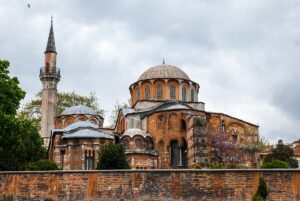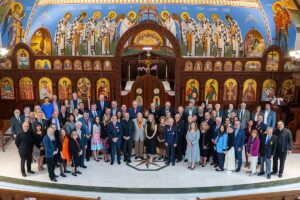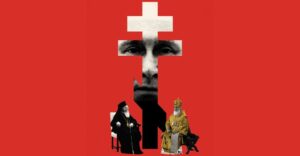Kairos Journal has recently reported on ‘Increasing Challenges for Christians in Modern Turkey’.
The mission of Kairos Journal seeks to embolden, educate, equip, and support pastors and church leaders as they strive to transform the moral conscience of the culture and restore the prophetic voice of the Church.
The article can be read in its entirety below.
Increasing Challenges for Christians in Modern Turkey
Read this article on the website of Kairos Journal
Turkey has been a secular republic for almost a century. Nevertheless, the country is being pulled in opposite directions by powerful forces. On one side are secularizing pressures, which have led many in Turkey to look increasingly westward toward Europe. In 2005, Turkey formally applied for full membership in the European Union, a process that has still to run its course. The EU is calling for Turkey to liberalize many of its political, social, and economic policies, including full implementation of freedom of religion among Turkish citizens, a concept enshrined in the Turkish Constitution.
On the other hand, the historic orientation towards the Muslim Middle East, facilitated by Turkey’s 99% Muslim population and grounded in Turkey’s Ottoman past, has provided a competing set of pressures, especially over the last two decades. In November 2002 the Islamist-based Justice and Development Party won a landslide election victory, cooling interest among some Turks in the European connection and reinforcing ties with certain Muslim nations of the Middle East.
The Turkish government officially recognizes three minority religions: Greek Orthodox, Armenian Orthodox, and Judaism. However, rising Islamic consciousness has led to an increase in discrimination and persecution directed against religious minorities. Here are several manifestations of that problem:
1. Turkish identity cards, a government prescription, stipulate the religious affiliation of each citizen of the state. These expose individual non-Muslims to discrimination and harassment, including lack of access to careers in state institutions. (1)
2. “Religious minorities [report] difficulties opening, maintaining, and operating houses of worship.” (2) Unfortunately, this accords with public sentiment: In a 2009 survey of a sample of Turks, 59% of respondents considered that non-Muslims should not be allowed to hold open meetings where they can discuss their ideas. Furthermore, 54% of respondents believed that non-Muslims should not be allowed to publish literature that describes their faith. (3)
3. Violence against Christians is on the rise. In 2006, a Catholic priest was shot and killed in Trabzon, Turkey. In April 2007, three Christians were bound, tortured, and killed by young Muslim radicals at a Christian publishing house at Malatya in southeastern Turkey. (4) In August 2009, a Muslim held a knife to the throat of a convert to Christianity, denouncing him as a “missionary dog,” who had betrayed Turkey by leaving Islam and evangelizing others. (5)
This 2009 incident perfectly represents the mindset described by Ziya Meral, a London-based Turkish scholar and activist: “To be a Turk is to be a Muslim, thus to leave Islam is to betray the Turkish nation.” (6) This same mindset prompted retired Turkish general Veli Kucuk to observe, in testimony at the Malatya trial, that the state lumped Christian missionary activity in with Muslim extremism, both seen as a threat to the nation. (7)
How sad and strange that Christians are abused today in Turkey. This was the land of Paul’s first missionary journey, of his epistles to Galatians and Ephesians, of Peter’s letter to the saints in “Pontus, Galatia, Cappadocia, Asia, and Bithynia” (1 Peter 1:1), of Revelation’s letters to the seven churches, and of early Church councils in Nicaea, Ephesus, and Chalcedon. But by A.D. 674, Muslims had already begun attacks on Constantinople, a campaign that would finally succeed when the Ottoman Turks captured the city in 1453. Thus, the land changed hands, and with it, the fortunes of its churches.
Turkey is clearly at a hinge point in its history, with the next decade likely to reveal whether the country moves closer to Western Europe or the Muslim world to the east. That decision will significantly impact Turkey’s fledgling and beleaguered Christian community
Footnotes:
1 – “Turkey: International Religious Freedom Report 2009,” United States Department of State Website, October 26, 2009, http://www.state.gov/g/drl/rls/irf/2009/130299.htm (accessed May 14, 2010).
2 – Ibid.
3 – “More than Half in Turkey Oppose Non-Muslim Religious Meetings,” Compass Direct News Website, December 4, 2009, http://www.compassdirect.org/english/country/turkey/12322/ (accessed May 14, 2010).
4 – Tony Carnes, “Jesus in Turkey: After 550 Years of Decline, a Bloodied Church Is Being Reborn,” Christianity Today Website, January 3, 2008, http://www.christianitytoday.com/ct/2008/january/12.25.html (accessed May 14, 2010).
5 – “Assailant in Street Attack in Turkey Ordered Released,” Compass Direct, February 12, 2010, http://www.compassdirect.org/english/country/turkey/15153/ (accessed May 14, 2010).
6 – Ziya Meral, “Muslim-Majority States and Human Rights: From the UDHR to Durban Conference”, Religion Compass 3/5 (2009): 879.
7 – “Turkey”, International Religious Freedom Report 2009, US Department of State Bureau of Democracy, Human Rights, And Labor, http://www.state.gov/g/drl/rls/irf/2009/130299.htm (accessed May 14, 2010).







